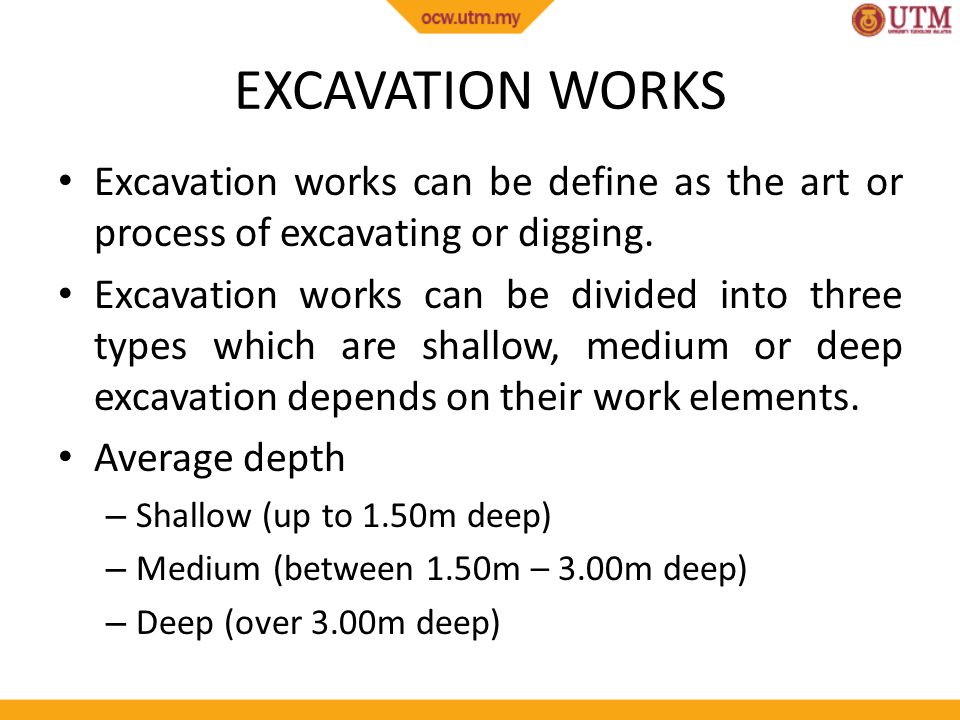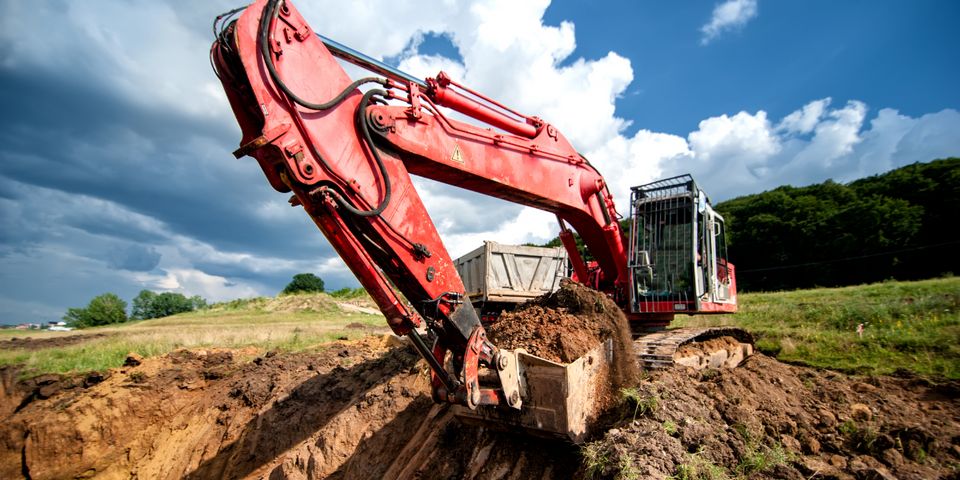Some Known Facts About Excavation Contractors Near Me.
Wiki Article
Excavation Contractors Near Me Fundamentals Explained
Table of Contents8 Easy Facts About General Contractor Shown9 Easy Facts About Concrete Contractors ExplainedTop Guidelines Of Excavation Contractors Near MeHow Mini Excavator can Save You Time, Stress, and Money.The Ultimate Guide To Concrete Contractors


Scrapers or Pans excavate soil in one location, haul and also discard the dirt in one more place (excavation contractors near me). It is difficult to match the performance of scrapes for cut/fill dirt operation if the haul range is much less then a mile. Scrapes are normally pulled by a rubber tire wheel tractor and are occasionally pressed with the cut area by a bulldozer.
There are many times that scrapers are not utilized for website grading as well as a dump vehicle is employed: the haul may be to long, the haul might cross roadways where scrapes are not permitted, acid rock might be run into, tools accessibility, and so on. Dump trucks are in usual use as well as most likely require little conversation.
Numerous vehicles have a top-hinged tailgate that can not discard any rock bigger after that the tailgate size. "Rock body" beds, on the various other hand, have no tailgates and also can unload any size rock, although their quantity capability is lessened. These web links show equipment specifications for several usual dump trucks. Compaction Equipment boosts the density of the dirt as well as sometimes gives a smooth, rolled surface.
General Contractor Things To Know Before You Buy
From a simple examination pit to percussion exploration to core exploration the owner has significantly extra expensive choices that produce significantly better data about the website underground. The Owner on a 100,000 SF structure job may accredit twenty dull areas with split spoon soil examples taken up until rock is reached as well as then core samples of rock.Recognizing the type as well as high quality of rock (from the core samples) and also area of rock (from the dirts boring) is a real benefit in jobsite planning. Conversely, the Proprietor of a 100,000 SF building may make a decision to continue with no geotechnical screening whatsoever. The decision concerning geotechnical testing is normally made by an Owner with no input from the Building Supervisor.
A knowledge of the approximate area of the rock helps the Construction Manager to prepare the series of actions complying with rock excavation. If rock is in one edge of a big structure job, for instance, the earth excavation can begin at the contrary end of the building in order to start structure job soonest.
Beginning the structure job early would be a good idea if the rock can be eliminated by ripping. Nevertheless, if the rock is incredibly tough and needs substantial blasting, it might be sensible to hold structure job up until the blasting is finished. The Construction Manager must work with these kinds of choices and utilize all the technical day readily available.
The 7-Second Trick For General Contractor
Unclassified excavation specifies that all rock or other unforeseen materials (omitting unsafe products) come across in the sitework will be the duty of the Contractor at no adjustment in agreement expense. An unclassified excavation is easier from a book-keeping point ofview and also places the duty for geotechnical problems onto the Sitework Service provider.It's amazing what a hefty rain can do to a building and construction task. Prior to the rain, the site may be completely dry, hefty equipment efficiently relocating planet, the various other professions efficiently doing their work.
In a lot of locations of the globe, the Construction Manager should bear in mind a simple reality: IT WILL CERTAINLY RAIN. Good preparation can decrease the damage as well as disturbance of a heavy rainfall to a jobsite. Usually the excavation and also grading is left to the Sitework Specialist (and their Foremen is accountable to monitor as well as guide the heavy equipment and operators).
The Building and construction Supervisor must be continuously aware of what rain will certainly do to the project site. It is not uncommon for the Sitework Supervisor to function their hefty equipment for maximum performance and also hope it doesn't rainfall. One of the most effective means to plan for rain is to incline all qualities to drain pipes and to smooth rolled the surface prior to a rain.
Excitement About Concrete Contractors
The Construction Manager must be far-sighted adequate to insure that hefty rain does not quit working on the job much longer than needed. Daily conversations with Sitework Foremen may be needed to attain this goal. Any time excavation is called for listed below the existing groundwater level on a job, the procedure of dewatering have to be thought about.In a genuinely natural dirt, the water travels so slowly through the clay or silt that dewatering is not generally needed for the reasonably short time of excavation. Dewatering might be needed for a navigate to this website single footing excavation or for a whole task site. The most common dewatering methods are trench drains, deep wells as well as well points.

Ground water infiltration can also be lowered by cutoff methods such as sheet loading. The costs for dewatering can demolition contractors be astonishing, consisting of devices leasing, labor and also electrical power (or gas). High dewatering prices have faded the profit margins on much way too many jobs. The numerous variables listed here make the work of approximating dewatering expenses extremely challenging, as well as very inexact.
This choice needs to constantly be taken into consideration when analyzing the possibility of dewatering. Clearly the alternative is just practical if gravity can run the water to lower ground. Trench drains can be reduced with a backhoe and also loaded with a rugged, granular material (# 4 rock as an example), but care has to be exercised in selecting the water outlet type and area.
Not known Facts About Excavation Companies
A siphon, by definition, utilizes atmospheric stress to carry water from one elevation, up over a barrier, to a lower elevation. The pipes in a siphon system have to be closed as well as some ingenuity is frequently called for to totally fill the siphon pipeline. The siphon pipeline need to general excavating be complete for the siphon to begin.A deep well includes a pump, tube and also a vertical well casing. The pump consumption is at the base of the well casing (typically some crushed stone is put there as a filter tool) (general contractor). The water is pumped up the tube, out of the well housing, as well as to a suitable discharge location.
In a crude sand, for example, a huge area can be pumped to near the pump consumption altitude. A less permeable soil, on the other hand, lowers the performance of a deep well. Considering that the pump is usually at the end of the deep well, there are no elevation restrictions due to vacuum lift, as well as deep wells can reduce the groundwater over 50 feet.
On the bottom of the wellpoint there is a 2 foot long display and valve, water jets out of this shutoff and creates a hole right into which the wellpoint pipeline can be lowered. This opening is typically made a bigger size (for instance 10 inches) to allow for a rugged sand backfill to help filter the water (excavator).
Report this wiki page